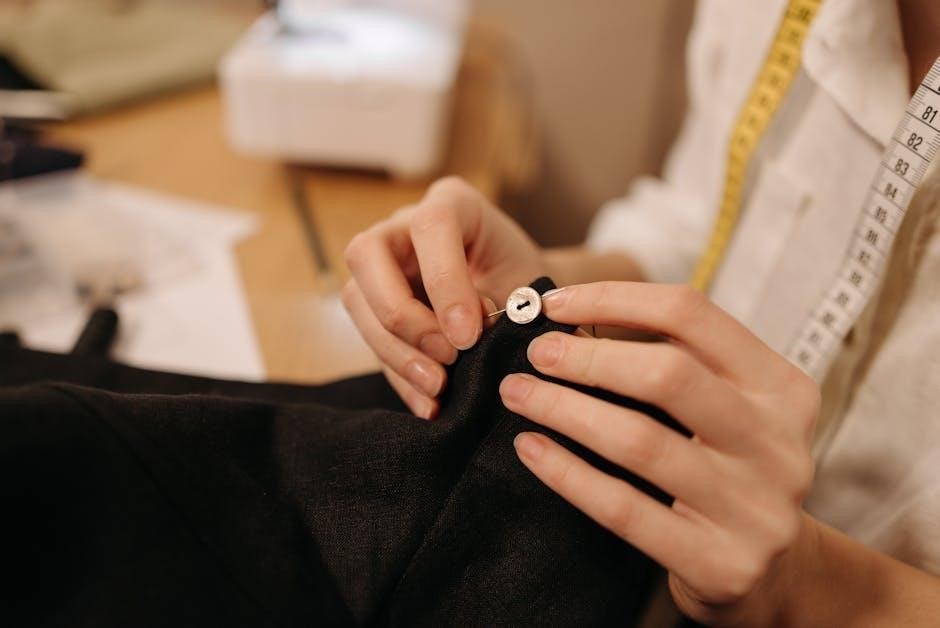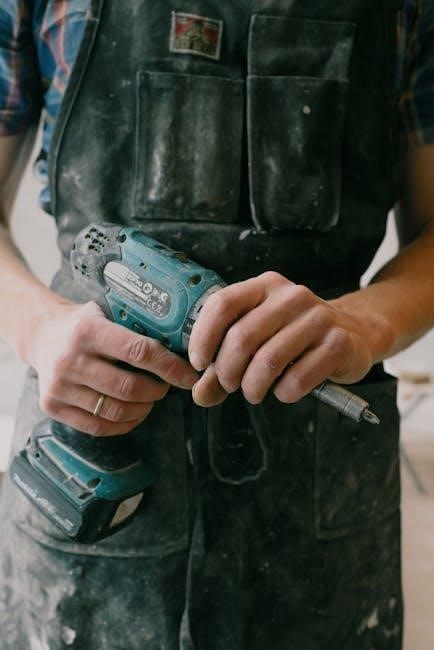Crossword clues are concise definitions or riddles that guide solvers to the correct answer. They enhance cognitive skills and vocabulary, making them a popular intellectual activity.
What Are Crossword Clues?
Crossword clues are hints or definitions provided for each answer in a crossword puzzle. They guide solvers to the correct word or phrase, often requiring wordplay, general knowledge, or vocabulary skills. Clues can be straightforward or cryptic, making the solving process engaging and challenging. For the clue “Relating to manual work,” solvers must think of terms associated with physical labor or specific worker categories. Common answers include “blue-collar,” referring to workers in manual or service industries, or “manual laborer,” emphasizing hands-on tasks. These clues test one’s ability to connect descriptions with appropriate terminology, enhancing problem-solving abilities and linguistic understanding.
Importance of Understanding Clues
Understanding crossword clues is crucial for solving puzzles effectively. Clues provide hints or definitions that lead to the correct answer, often requiring wordplay, general knowledge, or vocabulary skills. For the clue “Relating to manual work,” solvers must connect the description with terms like “blue-collar” or “manual laborer.” These clues enhance problem-solving abilities and linguistic understanding. Recognizing patterns and meanings in clues improves overall puzzle-solving skills, making it essential to grasp their structure and nuances. This understanding not only aids in completing crosswords but also enriches one’s vocabulary and cognitive abilities.

Possible Answers for ‘Relating to Manual Work’ Crossword Clue
The primary answer is “Blue-Collar,” referring to manual labor. Alternatives include “Labourers” or “Manual Labourer.” “LABOUR” is another common solution, fitting a 5-letter format.
Primary Answer: Blue-Collar
The term “Blue-Collar” is the most common and widely accepted answer for the crossword clue “Relating to Manual Work.” It refers to workers who engage in physical or manual labor, often in industries like manufacturing or construction; This phrase is derived from the traditional blue uniforms worn by such workers. In crossword puzzles, “Blue-Collar” is frequently used as an 11-letter solution, fitting the (4,6) pattern, making it a popular choice for constructors. The term is deeply rooted in cultural and socioeconomic contexts, distinguishing manual laborers from “White-Collar” professionals. It’s a concise and fitting definition that aligns perfectly with the clue, making it the go-to answer for solvers.
Alternative Answers: Labourers, Manual Labourer, etc.
While “Blue-Collar” is the most popular answer for the crossword clue “Relating to Manual Work,” other alternatives exist depending on the crossword’s specific requirements. “Labourers” is a common alternative, referring to individuals who perform physical or manual labor. Similarly, “Manual Labourer” is another possible solution, emphasizing the hands-on nature of the work. Other variations, such as “Casual Workers” or “Factory Hands,” may also appear, depending on the clue’s wording and the puzzle’s context. These alternatives often vary in length and specificity, making them suitable for different crossword grids. While “Blue-Collar” remains the most widely recognized term, these options provide additional possibilities for constructors and solvers alike. Each term captures the essence of manual work, though their usage may differ based on regional language preferences or crossword puzzle design.
Commonly Searched Solutions
The crossword clue “Relating to Manual Work” often leads solvers to search for terms like “Blue-Collar,” which is the most frequently sought-after answer. However, other commonly searched solutions include “Labourers” and “Manual Labourer,” both of which directly reference individuals engaged in physical work. These terms are widely recognized and appear frequently in crossword puzzles due to their relevance to various industries and contexts. Additionally, shorter alternatives like “LABOURERS” (9 letters) or “HANDS” (4 letters) may also be considered, depending on the crossword’s grid requirements. These solutions are popular because they align with common definitions of manual work, making them easier for solvers to identify. The diversity of possible answers ensures that constructors can tailor clues to fit different puzzle styles and difficulty levels.
How to Approach the Clue
Start by carefully reading the clue and identifying key terms related to manual work. Consider both literal and metaphorical meanings. Use word lengths as hints and look for common patterns. Think about general knowledge related to labor and industries to narrow down possibilities.
Analyzing the Clue Itself
When analyzing a crossword clue like “Relating to manual work,” start by breaking it into key components. The phrase “relating to” indicates a connection or association, while “manual work” refers to physical labor or tasks done by hand. Consider synonyms or phrases that encapsulate this concept, such as “blue-collar,” which is commonly associated with manual labor. Look for hints like word length or patterns, which can narrow down potential answers. Additionally, think about related terms like “laborers” or “manual laborers,” which might fit the context. Cross-referencing with industry-specific jargon or historical references can also provide insights. By carefully dissecting the clue and exploring its various angles, you can identify the most plausible solutions efficiently. This systematic approach helps in eliminating less likely options and zeroes in on the correct answer.
Using Word Length and Patterns
Determining the word length and identifying patterns are crucial strategies for solving crossword clues like “Relating to manual work.” If the clue specifies a 10-letter answer, for instance, “blue-collar” fits perfectly. Look for common prefixes or suffixes that relate to manual labor, such as “manual” itself or “-worker.” Patterns like “blue-” for blue-collar jobs can also guide you. Additionally, considering the structure of the grid can help you align letters with intersecting clues. By focusing on these elements, you can systematically narrow down potential solutions and increase your chances of finding the correct answer. This methodical approach ensures that you make the most of the information provided and efficiently solve the puzzle.
Consulting Crossword Solver Tools
Crossword solver tools are invaluable resources for tackling clues like “Relating to manual work.” Websites such as CrosswordSolver.com allow users to input the clue and any known letters, providing a list of potential answers. These tools leverage extensive databases to match patterns and word lengths, making them highly effective for finding solutions quickly. For example, entering “Relating to manual work” with a 10-letter constraint might yield “blue-collar” as the top result. Additionally, many solvers offer definitions and usage examples, helping to confirm the correct answer. While these tools can simplify the process, they are best used as a last resort to preserve the challenge and learning aspect of crosswords. They are particularly useful for verifying answers or overcoming stubborn clues that stump even experienced solvers.

Related Concepts and Themes
Manual work relates to labor involving physical effort, often in industries like manufacturing or construction. It connects to themes such as blue-collar jobs, workforce dynamics, and skill-based trades.
Manual Labor in Different Contexts
Manual labor varies across industries, from construction to agriculture, requiring physical effort and specific skills. In manufacturing, it involves assembly lines and machinery operation. Agricultural workers engage in planting, harvesting, and livestock care. Service industries also rely on manual labor for tasks like food preparation and maintenance. Historical contexts show manual labor as a cornerstone of economies, with roles evolving alongside technology. Crossword clues often highlight these diverse applications, linking them to terms like “blue-collar” or “laborer.” Understanding these contexts aids in solving clues related to manual work, as the answer may depend on the industry or era referenced. This diversity makes manual labor a rich topic for crossword puzzles, offering multiple angles for clues and solutions.
Industry-Specific Terms
Different industries often have unique terms to describe manual work and workers. For instance, in manufacturing, terms like “factory hands” or “assembly line workers” are common. Construction sites refer to “laborers” or “crew members,” while agricultural settings might use “fieldworkers” or “farmhands.” Transportation industries often mention “dockworkers” or “freight handlers.” These industry-specific terms frequently appear in crossword clues, requiring solvers to think about the context of manual work within specific sectors. Understanding these terms can help narrow down possible answers, as they often align with the clue’s wording. For example, “manual workers in factories” might point to “labourers” or “factory hands.” Recognizing these nuances enhances crossword-solving skills and expands vocabulary related to manual labor across various fields.
Historical References to Manual Work
Manual work has been a cornerstone of human progress throughout history. In ancient civilizations, terms like “artisan” or “craftsman” were used to describe skilled manual workers. During the Industrial Revolution, phrases such as “factory hands” or “mill workers” became common, reflecting the shift from agrarian to industrial societies. Historical references often appear in crossword clues, requiring solvers to connect modern terms with their historical roots. For example, “manual workers in ancient times” might refer to “slaves” or “serfs,” while “manual workers during the Industrial Revolution” could point to “factory workers” or “labourers.” These historical references not only add depth to crossword clues but also provide insight into the evolution of work and labor across different eras. Understanding these connections can enhance one’s ability to solve clues related to manual work.

Tips for Solving Crossword Puzzles
Start with easy clues to build momentum. Use word patterns and letter overlaps to fill in gaps. Consult online tools for tricky answers, and stay patient for complex puzzles.
General Strategies for Crossword Solving
Mastering crosswords involves a blend of vocabulary, logic, and persistence. Begin by tackling clues with known answers to fill gaps and reveal patterns. Pay attention to clue types—definitions, anagrams, or puns—and adjust strategies accordingly. Use word lengths and common letter combinations to narrow down possibilities. Cross-referencing across and down clues can unlock stubborn answers. Stay organized by tracking solved letters and updating possibilities. Practice regularly to build familiarity with clue styles and expand your knowledge base. For challenging clues, like “relating to manual work,” consider synonyms or related terms, such as “blue-collar” or “manual labor,” and verify against the available letters. Utilize online solvers or dictionaries when stuck, but rely on them sparingly to maintain the challenge. Patience and systematic approaches are key to conquering even the toughest puzzles.
Common Pitfalls to Avoid
When solving crosswords, several pitfalls can hinder progress. Overthinking simple clues is a frequent mistake, as straightforward answers may be overlooked. Assuming all clues are definition-based can mislead, as some involve puns or wordplay. Ignoring crossword conventions, like avoiding proper nouns or hyphens, can also lead to errors. For clues like “relating to manual work,” relying solely on direct synonyms might cause missed answers like “blue-collar.” Misinterpretation of clue phrasing, such as confusing “relating to” with “type of,” is another common issue. Failing to use word length and patterns effectively can prolong solving time. Relying too heavily on online solvers reduces the learning experience. Staying vigilant and methodical helps avoid these traps, ensuring a smoother and more rewarding puzzle-solving journey.
Maintaining a Fresh Perspective
Maintaining a fresh perspective is crucial for solving crossword clues effectively. Taking regular breaks can prevent mental fatigue and help solvers approach clues with renewed energy. Sometimes, stepping away and revisiting a puzzle later leads to quicker solutions. Additionally, challenging oneself to solve crosswords in different formats, such as cryptic or quick crosswords, can sharpen problem-solving skills. Staying open-minded to unconventional answers and considering less obvious interpretations of clues can also enhance success. Lastly, engaging with crossword communities or sharing puzzles with others fosters collaboration and exposes solvers to diverse thinking strategies. A fresh perspective ensures that solvers remain adaptable and creative, which is especially important for tricky clues like “relating to manual work.” By embracing these practices, crossword enthusiasts can consistently improve their abilities and enjoy a more rewarding experience.
The Role of Technology in Solving Crosswords
Technology aids crossword solvers through online tools, AI-driven apps, and language translators, providing quick answers and insights to clues like “relating to manual work,” enhancing problem-solving efficiency significantly.
Using Online Crossword Solvers
Online crossword solvers are invaluable tools for tackling clues like “relating to manual work.” These platforms allow users to input known letters or patterns, narrowing down potential answers efficiently. For example, entering “manual” into a solver can quickly yield “blue-collar” or “labourers.” Advanced algorithms search extensive databases to provide accurate solutions, saving time and reducing frustration. Additionally, many solvers offer features like anagram generators and crossword dictionaries, which can help decipher tricky clues. By leveraging these tools, solvers can overcome obstacles and complete puzzles with greater ease and confidence. This technological assistance is particularly useful for beginners or those seeking quick hints to move forward in their crosswords.
Google Translate and Language Tools
Google Translate and other language tools have become essential aids for crossword enthusiasts, especially when clues involve terms like “relating to manual work.” These tools can instantly translate phrases, helping solvers understand nuances in different languages. For instance, translating “manual labor” into another language can reveal synonyms or related terms that might fit the crossword pattern. Additionally, Google Translate’s AI-driven features now support real-time translations, enabling users to decipher clues more efficiently. The integration of camera translation for text and speech recognition further enhances the ability to solve crosswords quickly. These tools not only bridge language gaps but also empower solvers to tackle international crosswords with confidence, making them indispensable for modern puzzle-solving.
AI-Driven Features in Crossword Apps
AI-driven features in crossword apps have revolutionized how solvers tackle puzzles, including clues like “relating to manual work.” Advanced algorithms analyze vast databases to suggest answers based on clue patterns and word lengths. For example, apps can quickly identify that “blue-collar” fits the description of manual labor. AI also adapts to user behavior, offering personalized hints and learning from solved puzzles. Some apps now integrate AI-powered chat assistants to provide real-time explanations, helping users understand complex clues. These features significantly enhance solving efficiency and make crosswords more accessible to both beginners and experienced solvers. By leveraging AI, crossword apps not only simplify the solving process but also enrich the overall puzzle-solving experience with smart, dynamic tools.
The crossword clue “relating to manual work” primarily points to “blue-collar,” with alternative solutions like “labourers” or “manual labourer” also considered. This concludes the exploration of the topic.
The crossword clue “relating to manual work” revolves around identifying terms associated with physical labor. The primary answer is blue-collar, referring to workers in manual professions. Alternative solutions include labourers, manual labourer, and other related terms. These answers are derived from crossword databases and solvers, ensuring accuracy and relevance. The clue often appears in various crosswords, such as The Independent and Newsday, highlighting its popularity. Understanding the context and using tools like crossword solvers can aid in finding the correct answer efficiently. This summary encapsulates the key points discussed, providing a clear overview of the topic.
Final Thoughts on Crossword Clues
Crossword clues like “relating to manual work” offer a fun and challenging way to engage with language and problem-solving. They not only test vocabulary but also encourage critical thinking and creativity. Solving such clues can be rewarding, as it often leads to discovering new words or concepts. For instance, understanding terms like blue-collar or labourers provides insight into societal roles and industries. Additionally, using tools like crossword solvers or translation apps can enhance the experience, especially for beginners. Persistence is key, as some clues may require multiple attempts to crack. Overall, crosswords are a delightful way to sharpen mental acuity while exploring the nuances of language. Keep practicing, and soon you’ll master even the trickiest clues!

Frequently Asked Questions (FAQs)
What Does ‘Relating to Manual Work’ Mean?
It refers to tasks requiring physical effort, often associated with blue-collar jobs or labor-intensive roles.
How Do I Find the Best Answer for This Clue?
Use crossword solvers or analyze word patterns; blue-collar is a common solution.
Are There Multiple Possible Solutions?
Yes, alternatives like labourers or manual labourer may fit depending on the crossword’s context.
The phrase “relating to manual work” refers to tasks or activities that involve physical labor or hands-on effort, typically associated with blue-collar jobs. It encompasses jobs that require practical skills rather than desk-based or managerial roles. Examples include construction workers, factory hands, or craftsmen. This term is often used in crosswords to describe occupations that involve direct physical involvement in production or service delivery. Understanding this clue is essential for solving puzzles related to employment categories or labor types. The most common answer is blue-collar, which directly relates to manual labor. This term is widely recognized and frequently appears in crossword puzzles as a key definition for such clues.
To find the best answer for the crossword clue “Relating to manual work,” start by analyzing the clue itself. Look for keywords like “manual” or “work” that hint at the type of answer. Consider the word length and patterns, as crosswords often provide letter counts or partial letters. Using crossword solver tools or dictionaries can help narrow down possibilities. Inputting known letters can filter results effectively. Additionally, think about related concepts like blue-collar jobs or labourers, which are common answers for this type of clue. Cross-referencing with industry-specific terms or historical references to manual labor can also provide insights. Avoid common pitfalls like overcomplicating the clue or ignoring obvious connections. By staying focused and using these strategies, you can efficiently identify the correct answer for your crossword puzzle.
Yes, multiple possible solutions exist for the crossword clue “Relating to manual work.” The primary answer is often blue-collar, referring to workers in manual or service industries. Alternative solutions include labourers, manual labourer, or blue-collar workers. These terms are commonly associated with manual work and fit various crossword patterns. Additionally, less common solutions like casual workers or hands might also appear depending on the crossword’s context. The variety of answers ensures that crosswords remain challenging yet solvable, catering to different solver experiences. By considering these alternatives, you can more effectively navigate the puzzle and find the correct fit for the given clue.
